Do you ever find yourself wanting to save a YouTube video for offline viewing, only to be frustrated by limited YouTube to MP4 Converter options, ads, or low-quality downloads? Maybe you’re looking for a quick way to convert a video to MP4 without the hassle of installing software or navigating spammy websites.
Many people share this struggle—finding a reliable, easy-to-use YouTube to MP4 converter that offers high-quality results can feel like searching for a needle in a haystack. But don’t worry, you’re in the right place. This post highlights the best online YouTube to MP4 Converters with features that make the process smooth and hassle-free, from batch downloads to HD options and more.
But what if you’re tired of the limitations of these tools and want a custom solution? In addition to listing the top YouTube to MP4 Converters, we’ll guide you through creating your own YouTube to MP4 converter, offering two approaches: a hands-on coding guide and an option to use ChatGPT-4 prompts to build it with minimal effort.
By the end of this post, you’ll know which online tool suits you best or have a step-by-step plan to build your own YouTube to MP4 Converter, turning any YouTube video into an MP4 with ease and flexibility. Whether you’re a tech enthusiast or just want a simple solution, this post has you covered.
1. Transkriptor
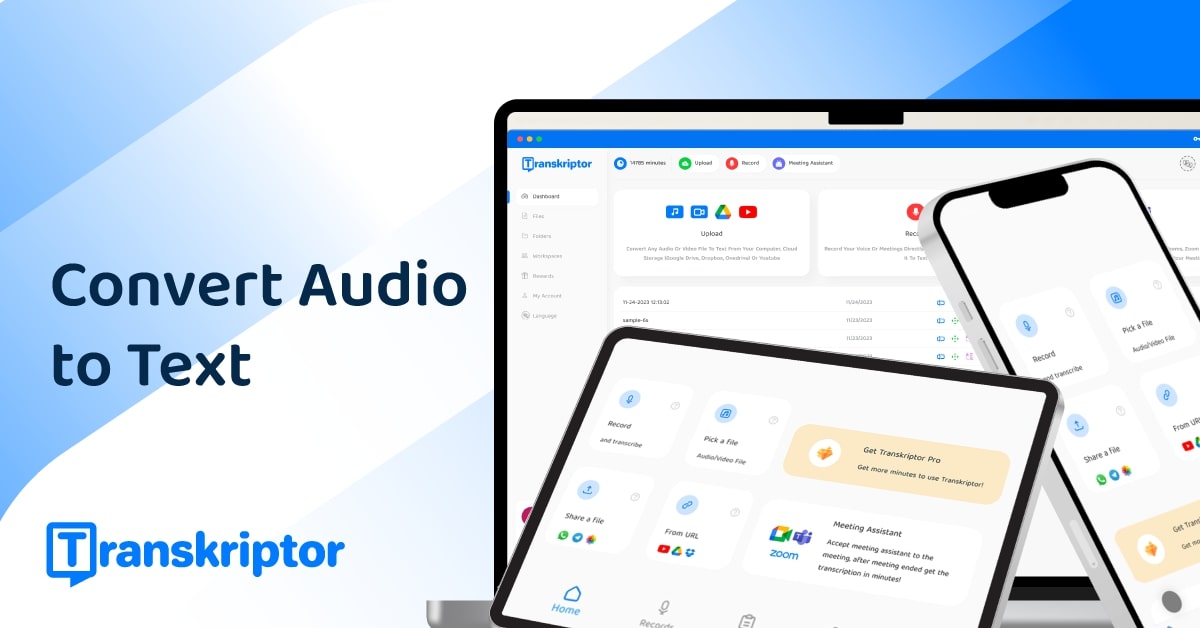
| Feature | Description |
|---|---|
| Purpose | AI-powered transcription tool to convert audio/video to text |
| Supported Formats | MP3, MP4, WAV, MOV, AVI, etc. |
| Languages Supported | Multiple languages, including English, Spanish, French, German, Italian, etc. |
| Accuracy | High accuracy rate with AI models; manual editing is available |
| Editor | Integrated online editor to correct and adjust transcripts easily |
| Auto-Punctuation | Automatically adds punctuation for readability |
| Time Stamping | Provides time stamps to make navigation easier within long files |
| Speaker Identification | Identifies different speakers (useful for meetings and interviews) |
| Export Formats | TXT, DOCX, SRT, PDF, VTT |
| Platform Compatibility | Web-based; works on Windows, macOS, and mobile browsers |
| Privacy & Security | Ensures data privacy with encrypted file handling and GDPR compliance |
| Subtitles Creation | Creates subtitle files for videos and other media |
Best For
- Students: Note-taking, lecture transcriptions.
- Content Creators: Converting videos to text, creating subtitles.
- Businesses: Transcribing meetings, interviews, and discussions.
- Journalists: Transcribing interviews for easy content creation.
- Individuals with Hearing Impairments: Adding subtitles to personal media for accessibility.
Personal Experience
From a user’s perspective, Transkriptor stands out for its simplicity and ease of use. The transcription accuracy is impressive, especially for clear audio, and the online editor is intuitive, making it easy to adjust transcripts as needed. The export options are versatile, making it easy to use transcripts in various formats. However, the accuracy can drop slightly for challenging audio, and it’s good to be prepared for minor edits when dealing with complex terminology or heavy accents. Overall, it’s a reliable tool for anyone needing regular transcription services.
Pros and Cons
| Pros | Cons |
|---|---|
| High accuracy for a variety of languages and accents | Accuracy may be lower in noisy audio or with multiple speakers without clear identification |
| User-friendly editor with easy-to-use correction tools | Occasional delays in processing for longer files |
| Supports a wide range of file formats | Limited offline functionality; internet connection is needed |
| Affordable pricing with flexible plans | Free plan offers limited minutes |
| Great for subtitle creation with time stamps and export options in SRT/VTT formats | Might require occasional editing for technical jargon |
| Secure, GDPR-compliant data handling | Speaker identification can sometimes be less precise |
2. savefrom.net
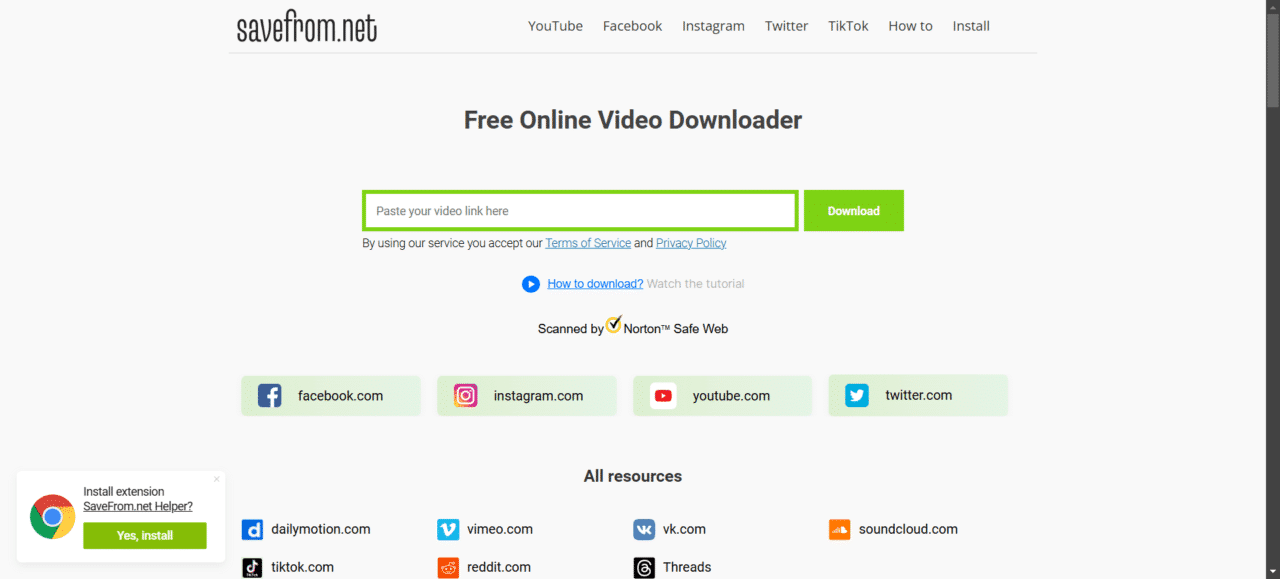
SaveFrom.net is an online video downloader that supports multiple platforms, including YouTube, Facebook, Instagram, Twitter, TikTok, and more. This tool allows users to download videos without needing additional software and supports various formats like MP4 and MP3.
SaveFrom.net also offers a Chrome extension that simplifies the downloading process. When installed, it adds a direct download button on YouTube pages. This means that whenever you visit a YouTube video, you’ll see an option to download it directly, making it extremely convenient. You can find more information and installation instructions for the extension on this page.
Additionally, SaveFrom.net works with a variety of other sites, making it a versatile option for downloading videos from different platforms.
| Feature | Description |
|---|
| Type | Online YouTube and other media downloader |
| Supported Sites | YouTube, Facebook, Instagram, Twitter, TikTok, and other social media platforms |
| Output Formats | MP4, MP3, WebM |
| Video Quality | Supports HD, Full HD, 2K, and 4K (if available in the original video) |
| Browser Extension | Available for direct downloading from the browser (adds a download button on supported platforms) |
| Ease of Use | Simple and user-friendly interface, with a URL input box for quick downloads |
| Download Speed | High-speed downloads, dependent on internet connection |
| No Account Required | Downloads without the need for registration or sign-in |
| No Software Needed | Completely web-based (except the optional browser extension) |
| Subtitles | Not supported |
| Security | Contains ads, but generally secure and trusted by many users |
Best For
- Casual Users: Ideal for people looking for a quick and easy way to download videos from popular platforms.
- Social Media Managers: Great for saving content from social media for offline use or sharing.
- Personal Archives: Suitable for archiving public videos from YouTube and other supported sites.
Personal Experience
In my testing, SaveFrom.net was straightforward and worked well for downloading videos from major platforms like YouTube and Facebook. The download speed was efficient, and the tool’s ability to handle HD and even 4K (when available) was impressive. However, the pop-up ads were somewhat intrusive, which could be a drawback for users who prioritize a completely ad-free experience. The optional browser extension makes it very convenient for regular use, as it adds a download button directly to video pages.
Pros and Cons
| Pros | Cons |
|---|---|
| Ease of Use: Very simple and intuitive interface. | Ads: Pop-up ads may be distracting for some users. |
| No Software Installation: Fully online, with an optional browser extension. | Limited Features: Lacks support for subtitles and does not support all formats. |
| Multiple Quality Options: Supports HD and 4K (based on original video availability). | Limited Compatibility: May not support all websites and formats. |
| Wide Compatibility: Works with major social media platforms like YouTube, Facebook, etc. | Privacy Concerns: Some users may find the ad-based model concerning for data privacy. |
| Fast Conversion: Downloads are relatively quick and efficient. | Browser Dependency: Some downloads only work properly with the browser extension installed. |
3. Downsub
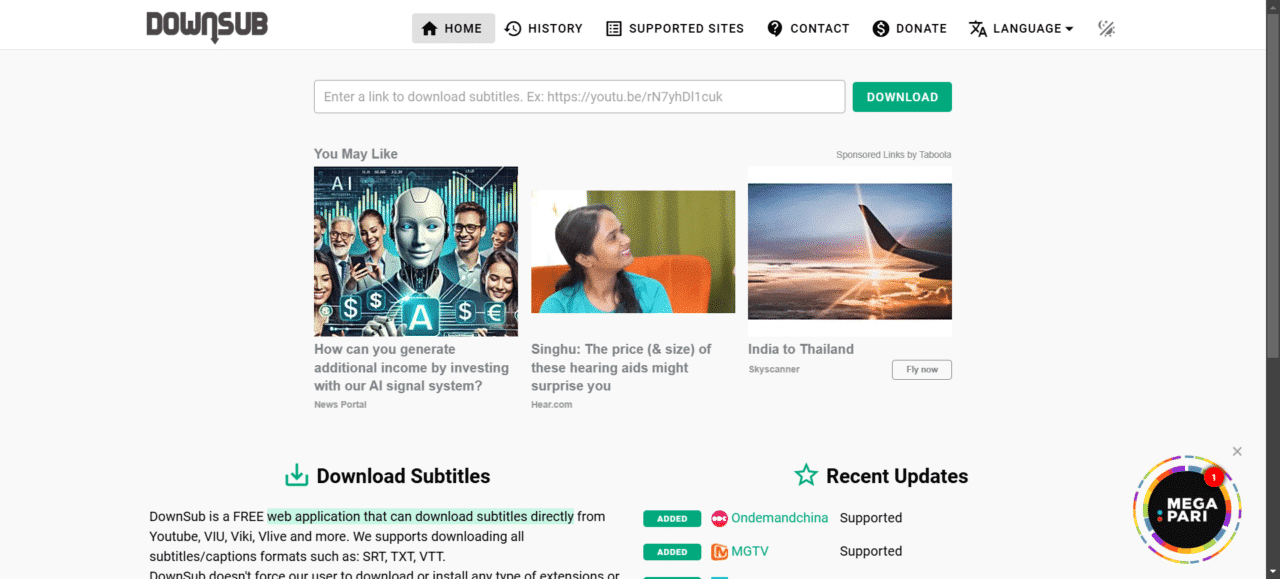
Downsub is an online tool for downloading subtitles from YouTube and other video platforms without needing any software installation. It’s a simple, web-based solution that caters to users who need quick access to subtitles in various languages for personal or professional use.
Features
| Feature | Description |
|---|---|
| Subtitle Download | Supports downloading subtitles directly from YouTube, Viki, VIU, and other platforms. |
| Multiple Languages | Provides subtitles in multiple languages if the video has them available. |
| Auto-Generated Subtitles | Can download auto-generated subtitles from videos where manual subtitles aren’t available. |
| SRT & TXT Formats | Subtitles can be saved in both SRT and TXT formats, allowing for flexible use and editing. |
| No Software Needed | Fully online, eliminating the need to download or install any software. |
| High Speed | Fast processing and subtitle retrieval; just enter the video link to download subtitles. |
| Simple Interface | User-friendly design with straightforward instructions and minimal steps. |
| Privacy | No login or personal data required, enhancing user privacy. |
| No Conversion Features | Only supports subtitle downloading, without any video or audio conversion. |
| Ad-Supported | Contains ads to maintain the free service, but they’re relatively non-intrusive. |
Best For
- Educational Purposes: Great for students or educators who want to use subtitles from online videos for notes or transcription.
- Language Learners: Useful for people learning languages who want to study video subtitles offline.
- Content Creators: Ideal for creators needing subtitle files for editing or adding to their content.
Personal Experience
Using Downsub has proven convenient and reliable for quick subtitle retrieval. The process is straightforward, and the service is generally fast. The ads are present but not overwhelming, which is reasonable given that the tool is free. However, it’s best for single-purpose subtitle needs rather than full video or audio downloads, making it ideal when you’re only looking for accessible subtitles.
In summary, Downsub is a valuable tool if your primary goal is to extract and save subtitles without any extra steps or installations.
Pros and Cons
| Pros | Cons |
|---|---|
| Fast and easy to use | Limited to subtitle downloading (no audio/video conversion) |
| No software installation required | Ads can be distracting |
| Supports multiple languages and formats | Subtitle formatting might need manual adjustments |
| Free and secure (no login required) | May not support subtitles for all video platforms |
| Works with popular video platforms | Relies on video platforms’ availability of subtitles |
4. YT1D.com
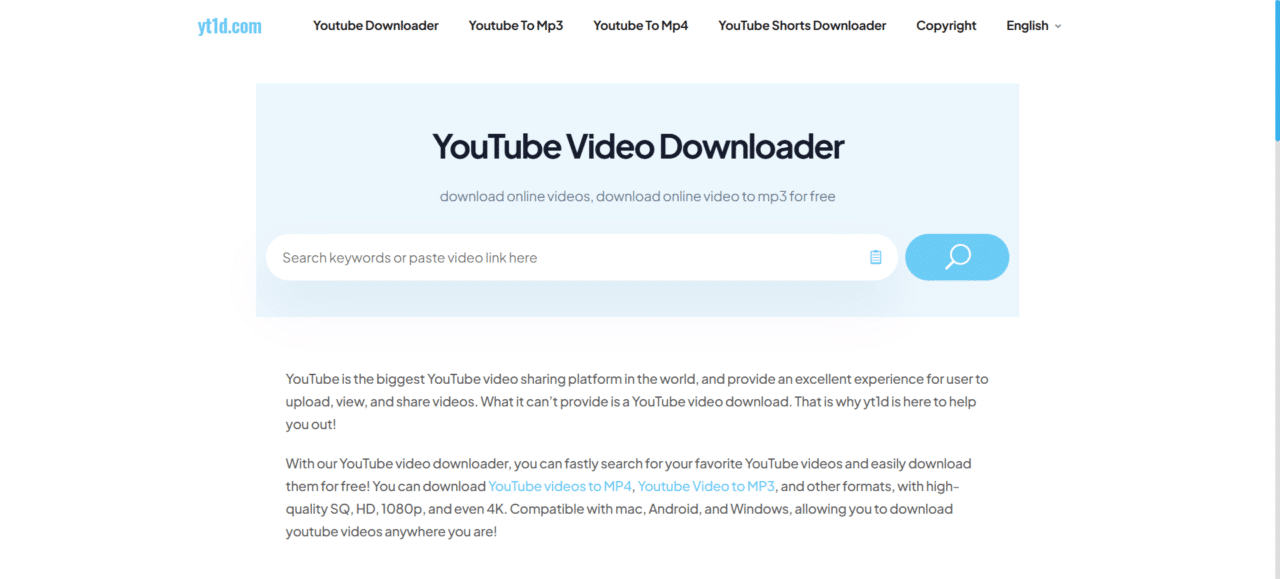
| Feature | Description |
|---|
| Popularity | Well-known for YouTube to MP4 Converter. |
| Speed of Conversion | Fast conversion speeds for short and medium-length videos. |
| Ease of Use | Simple and intuitive interface with minimal steps required. |
| Security and Privacy | HTTPS encryption; reasonable safety. |
| No Ads or Pop-Ups | Minimal ads; mostly clean user experience. |
| High-Quality Output | Supports HD quality downloads. |
| Format Support | Primarily MP4, but can also convert to MP3. |
| Subtitle Support | No dedicated subtitle download feature. |
| No Software Needed | Fully web-based; no downloads required. |
Best For:
- Casual Users: Ideal for users who want a fast and straightforward YouTube to MP4 conversion without additional features.
- HD Video Downloads: Great for those looking to download YouTube videos in high quality without needing an account.
- Mobile Compatibility: Works well on mobile browsers, so it’s convenient for users on the go.
Personal Experience:
Using YT1D.com is straightforward, especially with its clean layout and minimal steps to initiate downloads. Conversion speed is quick, and quality output meets expectations. The lack of subtitle support may be a drawback for some, but for basic MP4 and MP3 needs, this tool performs well. It’s reliable for typical conversions, though minor delays or temporary site issues can occasionally occur.
Pros and Cons
| Pros | Cons |
|---|---|
| Quick conversion speeds | Limited format options beyond MP4 and MP3 |
| User-friendly interface | Lacks advanced settings like resolution choice |
| Limited ads, mostly ad-free | No explicit subtitle support |
| Works well on both desktop and mobile browsers | Some ad-blockers may restrict access |
| Free to use with no registration required | Occasional downtime reported by some users |
5. SSYouTube
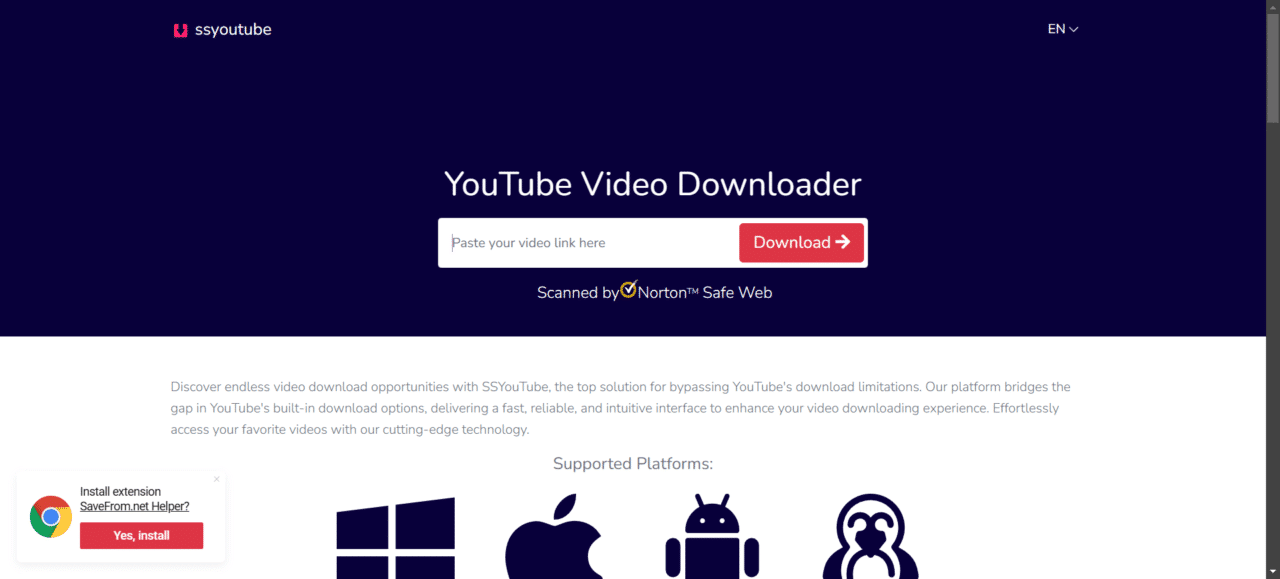
SSYouTube is an online video downloading tool primarily designed to convert YouTube videos into MP4 format. It’s a popular choice among users looking for a quick, ad-free solution without needing to install additional software.
| Feature | Description |
|---|---|
| Speed of Conversion | Provides fast conversion speeds, even for longer videos. |
| Ease of Use | Simple interface where users can paste the video URL directly into a text box, making it easy for beginners. |
| High-Quality Output | Supports multiple resolutions, including HD quality, allowing users to choose the best quality for their needs. |
| Multiple Formats | Offers video downloads in MP4 format and audio-only MP3 format, which is useful for users who want just the audio. |
| No Software Needed | Fully web-based, so there’s no need to download or install any software on your device. |
| Security & Privacy | Generally secure for users, with minimal ads and no pop-ups, making it less likely to expose users to harmful content or intrusive advertising. |
| Compatibility | Works on multiple devices, including smartphones, tablets, and computers, with no specific OS requirement. |
| Subtitles Option | Does not currently support subtitle downloads. |
| No Download Limits | Allows unlimited downloads without needing to register or log in. |
| Ad-Free Interface | Minimal ads and no pop-ups, which enhances user experience and reduces distractions. |
Best For
- Casual Users: Individuals who need a simple, fast YouTube to MP4 Converter without any complex features.
- People Without Technical Expertise: With its intuitive design, SSYouTube is great for users who aren’t familiar with technical details.
- Quick Audio Downloads: The MP3-only option works well for users who want to quickly extract audio from YouTube videos.
Pros and Cons
| Pros | Cons |
|---|---|
| Fast and reliable downloads | No subtitle download feature |
| Easy-to-use, straightforward UI | Limited format options (only MP4 and MP3) |
| High-quality video output | Limited video customization |
| No software download required | May lack some advanced features other tools provide |
| Compatible with all major devices | Relies on an internet connection for functionality |
How to Create Your Own YouTube to MP4 Converter
Creating your own YouTube to MP4 converter is a rewarding project, and there are two main methods to achieve it: coding your own from scratch or using ChatGPT-4 prompts to generate code. Below, we introduce these two methods, their requirements, and a step-by-step outline for each.
Method 1: Coding Your Own YouTube to MP4 Converter

This method is for those with some programming experience who want to build a custom YouTube to MP4 Converter. Here’s what you need to get started and an outline of the steps to follow.
Requirements Before You Start
Before diving in, you’ll need some foundational tools and skills to get started:
- Basic Programming Skills: Familiarity with coding languages like Python, JavaScript, or PHP is essential. Python, in particular, is useful due to its powerful libraries like
pytubeand compatibility withffmpegfor video processing. Basic HTML and JavaScript skills will help if you plan to create a web interface. - YouTube API Knowledge: YouTube’s Data API lets you access video data, including video URLs, metadata, and more. Using the API safely and responsibly ensures your tool complies with YouTube’s terms of service, especially since converting YouTube videos for offline use can sometimes have legal considerations.
- ffmpeg for Video Processing:
ffmpegis a versatile open-source library for handling multimedia files. It’s essential for converting downloaded videos into MP4 format, adjusting quality settings, and even extracting audio if needed. - Understanding of Hosting and Web Servers: To make your YouTube to MP4 Converter accessible, you’ll likely want to deploy it on a web server. Knowledge of basic hosting platforms (such as AWS or Heroku) and web server setups will help you get your tool online and accessible for use on various devices.
By understanding these requirements and skills, you’re well-prepared to create a custom YouTube to MP4 converter that’s tailored to your exact specifications, avoiding ads and enhancing usability for a seamless experience.
Steps to Build the YouTube to MP4 Converter:
- Set Up Your Environment: Install Python,
pytube,ffmpeg, and any additional libraries. This will be the backbone of your YouTube to MP4 Converter. - Fetch Video Data: Use
pytubeor similar to access the YouTube video URL, retrieve video metadata, and fetch the video stream. - Convert the Video to MP4: Integrate
ffmpegto convert videos to MP4 format with options for quality (720p, 1080p). - Design a Simple Interface (Optional): Create an HTML form where users can paste a YouTube URL and click “Download.” Use JavaScript to connect this frontend to your Python backend.
- Test & Deploy: Test the YouTube to MP4 Converter on different devices, optimize it for fast processing, and host it on a server like AWS or Heroku for online access.
Step 1: Set Up Your Development Environment
Before starting with coding, set up the necessary software and libraries:
- Install Python: Ensure you have Python installed. You can download it from Python’s official website.
- Install
pytube: This library helps extract YouTube video URLs and download video content. Install it by running:
pip install pytube- Install
ffmpeg:ffmpeghandles video conversion, resizing, and quality adjustments. Download it from FFmpeg’s website and add it to your system’s PATH.
Step 2: Fetch Video Data with pytube
In this step, you’ll use pytube to download videos from YouTube based on user input:
- Import the necessary libraries:
from pytube import YouTube
import os- Define a function to download the video:
def download_video(url, quality='720p'):
yt = YouTube(url)
stream = yt.streams.filter(res=quality, file_extension='mp4').first()
if stream:
print("Downloading...")
stream.download()
print("Download completed!")
else:
print(f"No video stream found with {quality} quality.")
- Error Handling: Enhance the function to handle common errors:
try:
download_video('https://youtube.com/some_video')
except Exception as e:
print(f"An error occurred: {e}")
Step 3: Convert the Video to MP4 Using ffmpeg
If the downloaded video is not in MP4 format or if you want to change quality or file size, use ffmpeg to convert it:
- Install
ffmpeglibrary for Python (if not already)
pip install ffmpeg-python- Add Conversion Code:
import ffmpeg
def convert_to_mp4(input_file, output_file='output.mp4', quality='720p'):
ffmpeg.input(input_file).output(output_file, video_bitrate=quality).run()
print("Conversion to MP4 completed!")- Execute Conversion: After downloading, call this function to convert the file to MP4.
Step 4: Design a Simple Interface (Optional)
For a user-friendly experience, design a simple HTML/JavaScript frontend. This optional interface lets users input a YouTube URL, select quality, and click a download button. Here’s how:
- Create an HTML Form:
<html>
<body>
<h2>YouTube to MP4 Converter</h2>
<form action="/download" method="post">
<label for="url">YouTube URL:</label><br>
<input type="text" id="url" name="url" required><br>
<label for="quality">Quality:</label><br>
<select id="quality" name="quality">
<option value="720p">720p</option>
<option value="1080p">1080p</option>
</select><br><br>
<input type="submit" value="Download">
</form>
</body>
</html>
- Create a Backend Server (Optional but useful for web access):
- Use a Python web framework like Flask or FastAPI to handle the form and call your Python functions for downloading and converting.
Step 5: Testing and Debugging
- Run Tests: Try downloading and converting a few videos to ensure everything works as expected. Test different resolutions, URLs, and handle edge cases like invalid links or unsupported formats.
- Optimize for Performance: Large videos can be slow to download or convert. Consider adding options for lower quality to improve speed.
Step 6: Deploy Your Tool
If you want to share your YouTube to MP4 Converter, consider deploying it online:
- Choose a Hosting Service: AWS, Heroku, or DigitalOcean are great options for hosting Python applications.
- Set Up Environment Variables: Protect your YouTube API keys and other sensitive information by using environment variables.
- Configure Dependencies: Ensure your hosting environment has
pytube,ffmpeg, and any other dependencies installed. - Test on Different Devices: Verify the tool’s usability on mobile, tablet, and desktop devices for optimal user experience.
Security Considerations
- API Compliance: Ensure you comply with YouTube’s terms of service and avoid downloading copyrighted material.
- Error and Exception Handling: Prevent crashes by handling exceptions gracefully, especially with unpredictable user input.
- User Privacy: If you’re saving data, avoid collecting personal information or use secure, encrypted storage.
By following these steps, you can create a custom YouTube to MP4 converter tailored to your needs. This approach gives you control over download quality, file format, and privacy, making it an ideal solution for tech-savvy users who want a flexible and efficient tool.
Method 2: Using ChatGPT-4 to Create a YouTube to MP4 Converter

For those who prefer a low-code or no-code solution, ChatGPT-4 can generate most of the code for you. By using structured prompts, you can instruct ChatGPT-4 to create a working YouTube to MP4 Converter with minimal technical effort.
Requirements for the ChatGPT-4 Approach
Before you start, here are the essential tools and setup needed:
- Access to ChatGPT-4: You’ll need a subscription to ChatGPT-4 or access to the OpenAI API.
- Python Environment: A Python setup on your computer where you can run and test code.
- Basic Understanding of Prompts: Familiarity with structuring prompts in ChatGPT-4 for precise results.
- Optional – Web Hosting Setup: If you plan to make the tool accessible online, a hosting service (such as AWS or Heroku) will be needed.
Step 1: Crafting Prompts for ChatGPT-4 to Create a YouTube to MP4 Converter
ChatGPT-4 can handle various aspects of this project, from downloading YouTube videos to creating a web interface. Each prompt should focus on a specific part of the project. Here’s a guide to the prompts and the intended outputs:
Prompt 1: Basic Python Code for Downloading YouTube Videos
Start by asking ChatGPT-4 to generate code to download YouTube videos in MP4 format.
Prompt:
“Write Python code using the pytube library to download a YouTube video in MP4 format. Include error handling for invalid URLs and allow options for quality settings, such as 720p and 1080p.”
Expected Output: ChatGPT-4 will generate a Python function that leverages pytube to download videos. It should include parameters for video quality and error-handling code, ensuring the download process is smooth and robust against invalid inputs.
Prompt 2: Adding ffmpeg for Conversion and Quality Control
Next, add ffmpeg functionality to ensure downloaded videos are converted to MP4 format and allow quality adjustments.
Prompt:
“Provide Python code that uses ffmpeg to convert a downloaded video to MP4 format. Explain how to adjust video quality and ensure the final output is saved in the desired resolution.”
Expected Output: The output will include code for using ffmpeg to convert video files and instructions for installing ffmpeg. This code allows you to specify quality settings (such as 720p or 1080p) and ensures the video output matches the desired resolution.
Step 3: Creating a Web Interface
With ChatGPT-4, you can create a simple, user-friendly web interface using HTML and JavaScript, which allows users to input a YouTube URL and select download options.
Prompt:
“Create an HTML form with a JavaScript script for users to enter a YouTube URL and select a download quality. The form should call a Python backend to handle the download and conversion process.”
Expected Output: ChatGPT-4 will generate HTML and JavaScript code that integrates with the Python backend. This interface allows users to paste a YouTube link, select quality options, and click a download button. You can then use Python frameworks like Flask or FastAPI to connect this frontend to your backend.
Step 4: Integrating YouTube Data API for Advanced Features
For a more sophisticated YouTube to MP4 Converter, integrate the YouTube Data API to fetch video metadata, such as titles and descriptions, directly from YouTube.
Prompt:
“Provide Python code to connect to the YouTube Data API, fetch video metadata, and securely store the API key. Include details on setting up API access.”
Expected Output: ChatGPT-4 will provide code for securely connecting to the YouTube API and handling video metadata. This is useful if you want to display video information, like the title and description, on the download page for a more complete user experience.
Step 5: Deployment Guide
Once your code is ready, deploying the tool online lets you and other users access it from any device. ChatGPT-4 can also assist in this process.
Prompt:
“Provide a deployment guide for hosting this YouTube to MP4 converter on Heroku or AWS, including all necessary configuration steps and security best practices.”
Expected Output: ChatGPT-4 will guide you through the deployment process, from setting up your hosting environment to configuring dependencies and securing API keys. This guide ensures that the tool is ready for public use and performs smoothly on different devices.
Step 6: Testing and Optimization Prompts
For the final stage, ensure your tool works effectively by testing it on various videos and optimizing for different scenarios.
Prompt:
“What are common optimization techniques to improve video conversion speed and file handling in this Python-based YouTube to MP4 converter?”
Expected Output: ChatGPT-4 will suggest techniques like multi-threading, file caching, or using alternative libraries for speed optimization. This helps you enhance performance, especially for larger files or multiple downloads.
Benefits of Using ChatGPT-4 for Building a YouTube to MP4 Converter
- Time-Saving: ChatGPT-4 handles complex coding tasks, providing ready-to-use solutions and explanations for each step.
- Ease of Use: The no-code approach simplifies the process, making it suitable for beginners with minimal coding knowledge.
- Flexible Prompts: You can refine prompts to adjust functionality, add features, or handle errors, tailoring the tool to your needs.
- Scalability: With deployment support, the tool can be accessible online, making it useful for personal or small-scale public use.
Drawbacks to Consider
While using ChatGPT-4 for code generation offers convenience, it may have limitations in handling highly customized functionalities or complex integrations that might require manual debugging and further coding knowledge.
By using ChatGPT-4 to create a YouTube to MP4 converter, you can quickly develop a functional tool without deep coding skills, while also gaining flexibility to adjust features to your exact needs.
Conclusion
In this post, we showcased some of the best YouTube to MP4 converters available online, including SaveFrom.net, Transkriptor, Downsub, YT1D.com, and SSYouTube. Each of these sites offers unique features, from easy, high-quality downloads to specialized functionalities like subtitle extraction and batch downloads.
They provide fast, reliable options to quickly convert and download YouTube to MP4 Converter, making it easy to choose the one that best fits your needs.
These tools are perfect for anyone seeking a straightforward way to save videos for offline viewing. However, for those interested in a more customized solution, we also outlined a detailed guide on building your own YouTube to MP4 Converter using Python or ChatGPT-4 prompts.
By following this guide, you can create a YouTube to MP4 Converter tailored to your preferences and technical level. Whether you opt for the convenience of these featured YouTube to MP4 Converter or choose to build your own, this post provides all the resources you need to start YouTube to MP4 Converter with ease.
FAQs
What is the best free YouTube to MP4 converter?
- The best converters include SaveFrom.net, YT1D.com, and SSYouTube, known for their user-friendly interfaces, fast download speeds, and high-quality output.
Is it legal to convert YouTube videos to MP4?
- Downloading YouTube videos is allowed for personal use only. Always respect copyright laws and YouTube’s Terms of Service, especially for protected content.
Can I create a YouTube to MP4 converter without coding skills?
- Yes! You can use ChatGPT-4 to help generate the necessary code. Simply follow prompts to create a functional, customizable tool with minimal coding knowledge.
What do I need to build my own YouTube to MP4 converter?
- For a coded approach, you’ll need Python,
pytube, andffmpegfor video processing. For a no-code option, access to ChatGPT-4 can guide you through the process with easy-to-use prompts.
How do I maintain video quality during conversion?
- Use converters that offer HD and quality options (720p, 1080p, or higher). If building your own,
ffmpegsettings can help preserve video quality.
Can I convert entire YouTube playlists to MP4?
- Yes, some tools like SaveFrom.net and SSYouTube support playlist downloads. If coding your own, additional setup with
pytubecan allow for playlist functionality.
Is it safe to use online YouTube to MP4 converters?
- Reputable sites like SaveFrom.net and YT1D.com are generally safe. Be cautious with unknown sites, avoid downloading executable files, and use secure, ad-free tools.


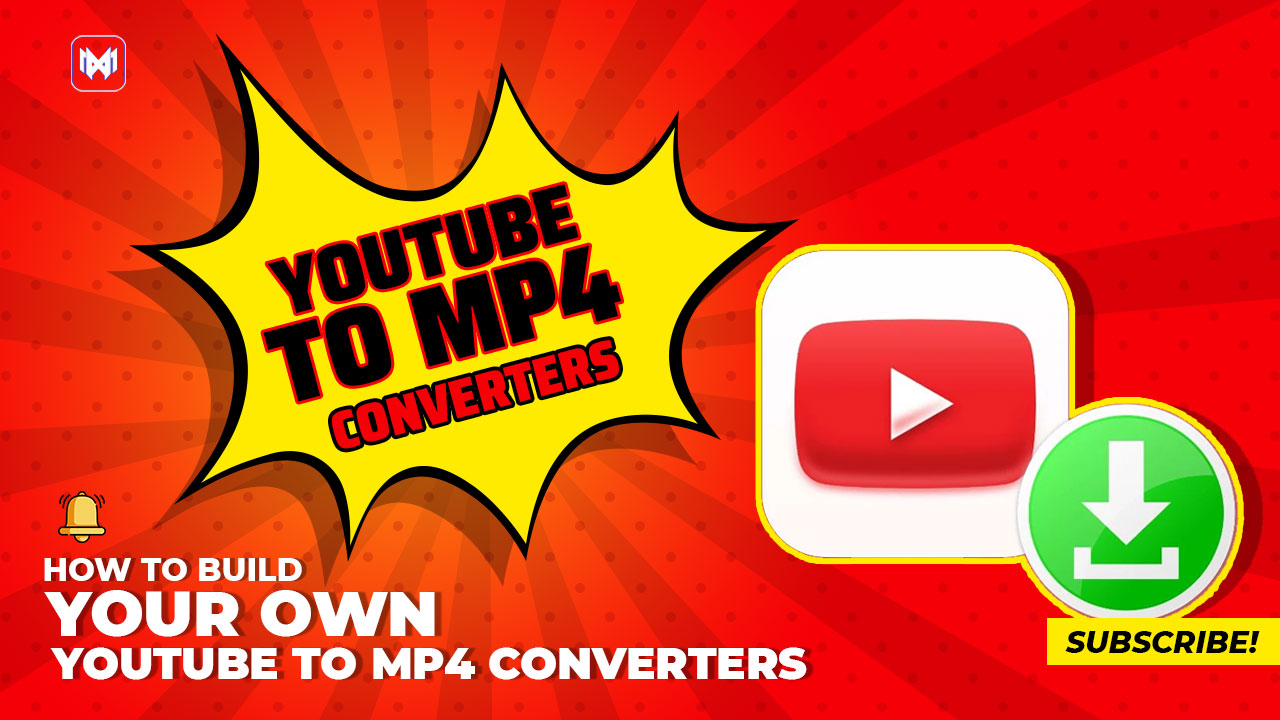






Leave a comment